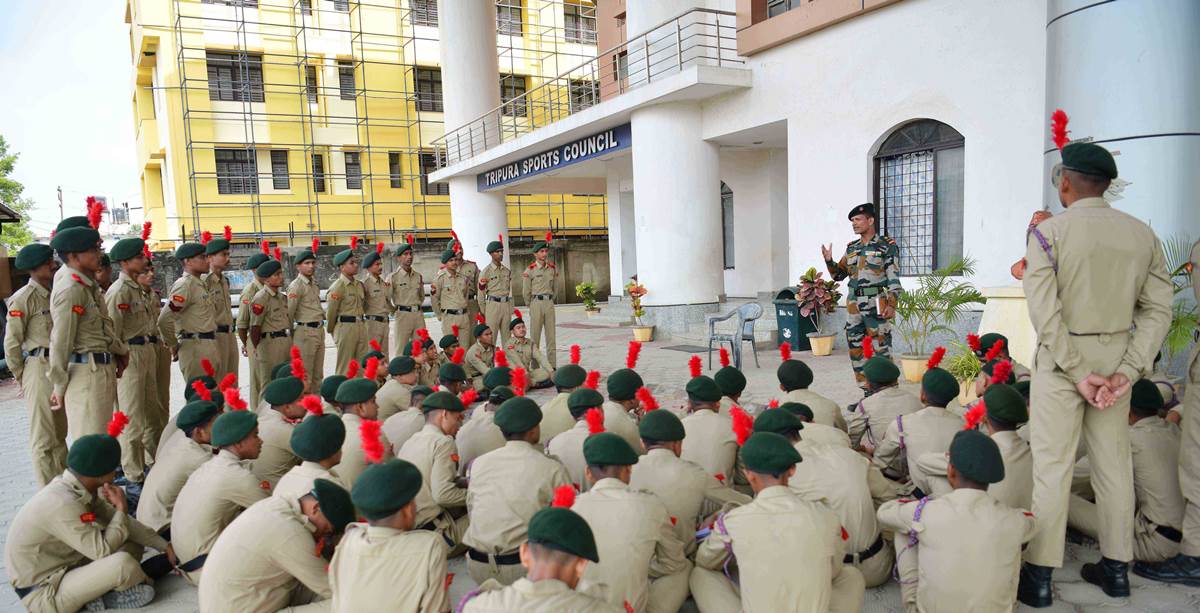 Indian Army Officials instructing NCC cadets (National cadets Corps), during Combined Annual Training Camp at Agartala on 11th June 2022. (Representative/Express photo by Abhisek Saha)
Indian Army Officials instructing NCC cadets (National cadets Corps), during Combined Annual Training Camp at Agartala on 11th June 2022. (Representative/Express photo by Abhisek Saha)The Delhi High Court on Wednesday listed several pleas challenging the Agnipath recruitment scheme for hearing on November 18, after the petitioners sought time to respond to the Central Government’s reply in the matter.
A bench of Chief Justice Satish Chandra Sharma and Justice Subramonium Prasad granted two weeks’ time to the petitioners to respond to the Centre’s consolidated reply filed in response to petitions challenging the scheme and the recruitment processes for armed forces under certain previous advertisements
The Central Government in its written reply has informed the Delhi HC that the scheme was promulgated to restructure the “intake & retention” processes in the armed forces with a view to evolving a “youthful, modern and futuristic fighting force”.
The Central Government in its counter affidavit has said that India requires a unique force as the character of future wars is likely to be ambiguous, uncertain, unrestricted and hybrid.
“The men and women serving the Armed Forces thus need to be physically fit, and mentally alert and should possess high risk-taking abilities. Experience has revealed that these abilities are accentuated in combative formations which are ‘young’. To man and safeguard such vast and difficult border terrains and to mitigate the exigencies required to keep such hostile border terrain safe from infiltration and external aggression, special technologies and human abilities are required,” said the Centre in its affidavit.
“With new military technologies emerging at a rapid pace, the time-tested conventional formations of the armed forces were losing their edge. This made structural changes in the overall organisation of the Indian armed forces a matter of necessity. In an endeavour to keep the armed forces fit and combat ready for meeting future exigencies and technological advancements, the defence experts suggested reformation in the organisation setup of the armed forces to achieve the golden thumb rule i.e. ‘The Armed Forces must be young and fit at all times’,” it added.
The affidavit states that the analysis of the existing structure of those below ‘officer’ rank divisions in the armed forces, found that the average age of an Indian Armed Forces personnel is 32 years, while that of foreign armed forces personnel is 26 years. The need to retain jawan, sailor or airman ranging between 15 to 20 years was the reason behind the increase in the average age of the armed forces.
According to the Centre, the Agnipath scheme will enhance the youthful profile of the Armed Forces i.e. reduce the average age profile of soldiers from 32 years to 26 years over a period of time.
The object behind the scheme, the Centre claimed, is to have a blend of young recruits between the ages of 18-25 years as ‘Agniveers’, supervised by experienced regular cadre personnel between the ages of 26 to 52 years, working under Commanding Officers within the age bracket of 37 to 40 years.
The scheme aims at recruiting youth into the armed forces for a period of four years during which they would be trained in basic combat and skill training. On completion of their service tenure, all Agniveers will be given the opportunity to be recruited into Armed Forces through enrolment in a regular cadre. “Based on Organisational requirements, up to 25 per cent of each specific batch shall be enrolled in the regular cadre of the Armed Forces following a robust, transparent and centralised selection process,” the affidavit stated.
Once the tenure is completed, 75 per cent of the Agniveers from a batch will exit as a disciplined and skilled workforce ready for any employment opportunity.
The Centre has further said that recruitment in the armed forces is an essential sovereign function, directly related to the maintenance of national security and the decision of the central government to make recruitment through the ‘Agnipath Scheme’ constitutes a policy decision taken by the government for national security reasons.
According to the Central Government, the training and discipline inculcated in an ‘Agniveer’ during his service period with the armed forces will not only infuse vigour into the three armed forces but would make them professional and technologically adept.
On the duration of service, the Central Government has said that the period of “four years” will be adequate for training the recruits. Thereafter, the concept of on-the-job training (OJT) on reaching units/places of deployment will ensure continuity in training apart from field exercises and training camps at the formulation level, the affidavit states.